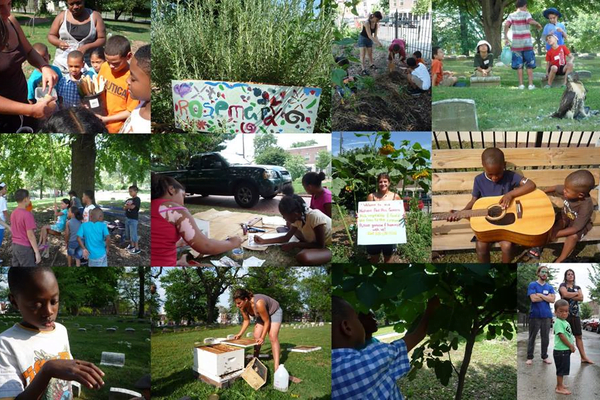Are you a community member and friend looking to propel food justice forward? Join the Grapevine and become a community advocate!
Impassioned letter to Land Bank Planning board
Tagged: archive
- This topic has 1 voice and 0 replies.
-
AuthorPosts
-
-
February 7, 2019 at 11:21 pm #216872
 aliKeymaster
aliKeymasterby Kirtrina Baxter | 08/07/2014

As some of you may know the land bank planning team has been meeting with stakeholders in the planning phase of the Land Bank Law. A group of Urban Agriculture folks were engaged in some of these meetings and the following writer, Robyn Mello, was one of the participants. After the meeting she thought about some of the issues that were presented and sat down to write this letter to Scott Page, a member of the Interface team (the design office assigned to inform the planning process of the law), who was at the meeting.Hi Scott,
I was quiet at the meeting because everyone else had so many other good things to say, but I have some thoughts now that I’ve gotten to sit on the meeting a little while:
I think that the non-monetary benefits of having more neighborhood open space & food growing for community self-reliance, improving health, facilitating communication, and granting access to fresh food are immense, and far too often overlooked in these kinds of strategic plans. I also think that, in dollars and cents (and sense), it is possible to calculate the kind of money that would be saved in healthcare costs, social welfare costs, city and CDC land management costs, food transportation costs, carbon offset/pollution costs, and more.
I’m 27. I moved to Philly after graduating from college 5 years ago, and I’ve been involved in community building and designing gardens in dozens of its vacant lots ever since, independently and with Historic Fair Hill and The Philadelphia Orchard Project (POP). I didn’t move to Philly with any gardening knowledge, but I quickly learned growing food and taking community control of vacant space was the most holistic approach to make any of the kinds of inroads I wanted for myself and others. The reason I moved into the North Philly/Kensington area from South Philly was specifically due to its vacant lots and the potential I see with them. I even tried to move out of the city last year for an opportunity to start my own organic farm, and I moved back to Kensington after realizing just how unique and beautiful the social, educational, and community-building side of growing with people, not for them, really is. That’s priceless.
The creative use of open space in Kensington/Norris Square/North Philadelphia/Hartranft/Fairhill by its White, Black, and Latino communities is generations deep now–with sideyards, backyards, pools, space for chickens, rabbits, pets, gardens, orchards, greenhouses growing tropical foods, community cafes, barbecues, you-name-it. People’s lives are very closely intertwined with many of these lots that are coming up for Sheriff Sale or going up on the RDA website with no notice to them, and the loss of that space, especially when most of the houses don’t have porches and the backyards are postage stamps–will completely shred lifestyles, routines, and future plans for many people.
Moreover, more security for open spaces also translates to higher investment in them. Gardens and community spaces that are secured or owned by their stewards naturally result in way more productivity, more aesthetically pleasing structures, the ability to generate self-sufficiency or profit over time, and more support from greening organizations. More long-term leases, conservatorships, and ownership of vacant lots would mean more orchards that The Philadelphia Orchard Project could plant because orchards and food forests take many years to design and mature. Imagine a Philadelphia in 10-20 years with free fruit-producing orchards in every single neighborhood! We already have near 40 orchards already. A garden-friendly city policy could really help to feed its citizens. The people capacity is there and grows greater over time–the security of feeling that one will be able to reap the benefits of hard work is what’s lacking and keeping capacity from growing.
Low-income neighborhoods in Philadelphia have existed almost invisibly from city authorities–economically, socially, and culturally–for years, other than through a few well-meaning politicians and extensive police surveillance. Now, as the buyers’ market ripens and developers catch news of Philly’s land management work, these neighborhoods are under extreme threat from development and gentrification without proper communication between those who live there and those who want to turn a profit.
They may not be part of our city’s highest economic echelons, but my personal experience has shown me that these neighborhoods are far more vibrant, supportive, resilient, resourceful, familial, and fun than other parts of the city, its suburbs, or other states or countries where I’ve lived. There are many young people moving into these neighborhoods around me because of their community culture and the ability to build community through urban agriculture (East Kensintgon/Fishtown and areas north of Northern Liberties and east of Temple, to be precise), but now the lots are getting swallowed up. You can barely drive through those neighborhoods without having to be detoured due to major construction of new houses by a small handful of developers, and their civic association zoning boards are overwhelmed trying to communicate rapid changes to residents. Many of the people who have lived there for generations, and those who have moved there in the past five years, no longer feel at home. Pushing stalwart residents and newcomers out is bad policy.I just bought a house in the Norris Square neighborhood with two super delinquent vacant lots next door because I decided it was time to really invest in this city in a way where politicians will listen, to make it my home, and to take over some lots for my own garden. I want to own those lots as quickly as possible, but they’re owned by someone I’ll most likely never be able to contact, and he’s never paid taxes on them. A CDC is maintaining them for him, and if I start to garden on them, he could still negotiate with a more wealthy, savvy developer right under our noses to build houses there at any time. Similarly, they could be pushed into Sheriff Sale by someone who knows they have the cash on hand to scoop them up rather than have them turned over to me and my neighbors as sideyards. City policy that involves so many people’s day-to-day lives being gambled with for a bit of revenue and real estate expertise is not policy written with residents and community bonds in mind.
I’ve been to lots of major cities in the U.S., and I live in Philly because I believe that it is truly a place where I can help to make a mark and grow. This city is caught between astatus quo, stuck-in-a-rut space where a lot of people aren’t able to envision the future because they have to be so concerned with their day-to-day ; and a socially progressive, model-city space where young people like me are excited to mold homes (with open space, sideyards, & gardens), careers, families, and grow into communities that care for each other. Gardening is my passion, and its lessons for mind, body, and spirit bleed into every other facet of life. Though many people involved in policy-building and city planning may not share that passion, you and they ought to know that the number of us who care about these things is large and growing rapidly. Please don’t forget about the multiple generations of mostly silent food growers and open space lovers as you write your assessment for City Council.
-
-
AuthorPosts
- The topic ‘Impassioned letter to Land Bank Planning board’ is closed to new replies.

